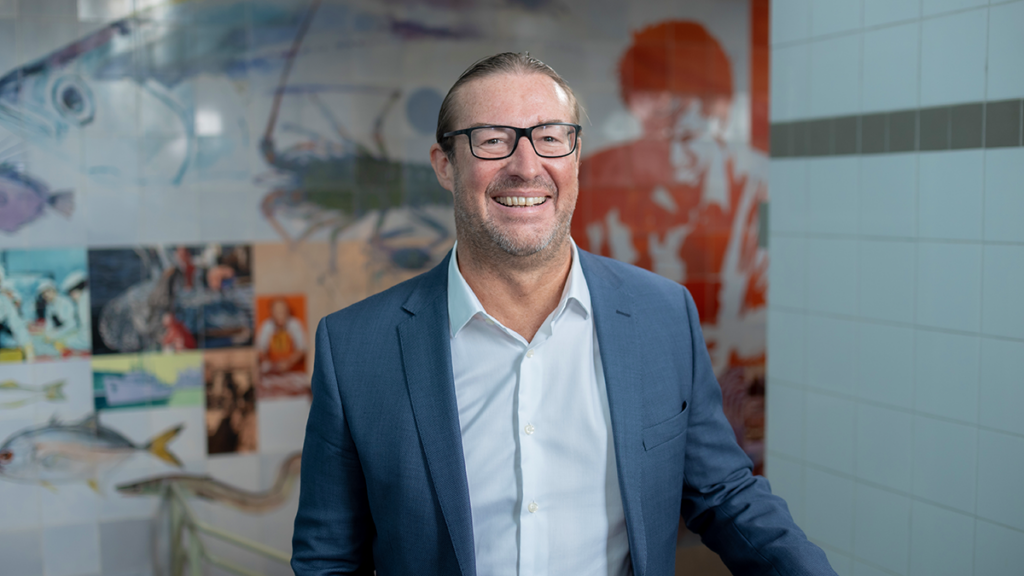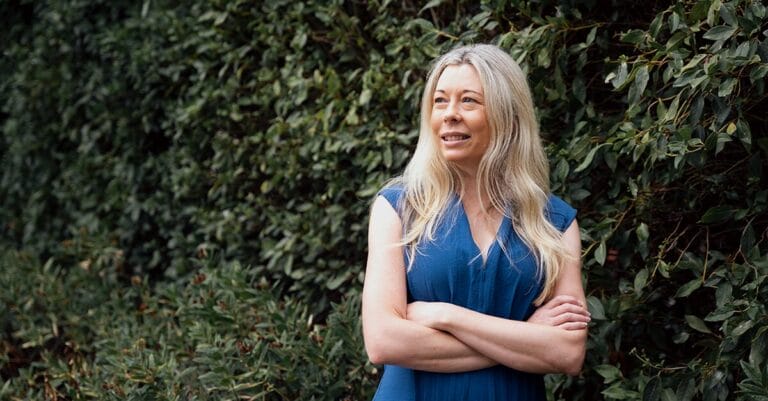

General Counsel Michael Guilday might bear the hallmarks of a successful old-school lawyer, but he is anything but old-school. Having spent much of his career as part of the distinguished magic circle in London, Hong Kong and Australia, he is now GC and Head of Property at Sydney Fish Market – and his sights are set firmly on the future, not the past.
Despite the prestigious haunts which have characterized much of his career, Michael’s route into the legal profession was far from traditional. At school, he excelled in math and science, but struggled with English. Although he was drawn towards law, his initial response to higher education was one of dismay. “I turned up to university, and there were books everywhere,” he laughs. “I realized I was going to have to do a hell of a lot of reading – and writing as well!”
With the support of his partner, who showed Michael how to find material that interested him, his reading skills improved – which in turn helped him to work on his writing. But one thing continued to hold him back. Still beset by his “terrible” handwriting, he was embarrassed every time he submitted a shoddy, hand-scrawled essay to his professors, and he began to seriously question whether he was cut out for life as a lawyer.
“If I had started my career earlier, before word-processing was a thing, I probably would have given up.”
Fortunately, Michael’s latter years at university coincided with the advent of the personal computer. As word-processing assignments became commonplace, he realized that his work “suddenly looked quite professional!”. This led to one of his earliest lessons, as he realized that, “If I was adaptive with the technology available, it would put me on at least a level playing field with others around me.” Since then, he has maintained a constant interest in the latest technology solutions, curious about how each might help lawyers do their best work.
Michael recalls his experiences of the early origins of email as another pivotal moment. In the late 1990s (pre-Microsoft), Wang computers, which were used for basic document drafting, also had a popular local messaging feature. “You could ‘Wang’ anyone in your office about your weekend or the latest gossip, but they weren’t intended for business purposes, and could only be received outside work hours. None of us knew what that [messaging feature] would later become.”
“The nature of the work that a lawyer does now, compared to twenty years ago, has shifted in my favor.”
The introduction of computers into everyday life proved to be merely the first ripple of a much wider paradigm shift, and few lawyers of that era could have imagined the emergence of concepts such as generative AI. But innovation is something Michael embraces – it is what has made his own success possible. “We all know things have changed; it’s brought legal work to a place that I am not only more comfortable with, but which I can actually enjoy.”
When Michael recalls the type of work that characterized his early career – “the dark years” as he refers to them – he talks about interminable days spent on huge M&A due diligence document review tasks and putting data into tables. For a long time, this type of mundane procedural work was perceived as a rite of passage at junior levels of the legal profession – a necessary evil to earn your stripes before getting into the more complex work. Thanks to technology, this landscape is changing fast.
“The work of a junior lawyer is now far more interesting than it ever was in my time,” says Michael. “A huge part of legal work is the ability to synthesize large amounts of information and translate it in a certain way. That hasn’t changed – but powerful tools like digital discovery software mean that we can spend a fraction of the time on the first part and shift our focus far more quickly to the second – which in-house means skipping straight to what matters and translating that to the business.”
Looking back, there’s a clear pattern that emerges from Michael’s own experiences with tech – a series of pivotal moments which he jumped on early in the adoption process, investing in the potential of an idea without really knowing what the long-term outlook or benefit might be. For him, this has paid off – but ultimately he recognizes “the power of this technology comes from mass adoption, when everyone’s in on it, and everyone is connected”. As with all new ideas, this means someone has to be the first to take the leap!
Of course, not everyone is as open to innovation as Michael is – and for senior legal leaders (who, critically, are also usually the final decision makers) who have spent entire careers working a particular way, even the simple act of contemplating this kind of transition is tough. Michael says this is one of the biggest challenges currently facing corporate legal professions. “I have worked with a lot of tech naysayers, and it’s incredibly frustrating.”
So, what is the antidote to this entrenched thinking? Michael’s advice is nuanced; he’s a big advocate of leading by example, but at the same time, he isn’t afraid to call it a day when he meets resistance. “When someone has deep-seated views, changing them isn’t easy. If you’re not ideologically aligned, you’re likely to ultimately come up against significant problems. There will always be efficiency pressure, but if you can’t leverage tools to help, it may be better to jump off the sinking ship than to go down with it.”
The good news is that as tech savvy juniors progress in seniority, this problem is unlikely to persist for much longer.
“For the future generation of lawyers, continued adaptability will be vital. We can’t continue to do the same thing and expect different results.”
With evolving approaches to legal work, what is Michael’s take on the changing demands facing in-house lawyers in the future? He thinks the shift is likely to be fairly radical. “It’s no secret that data is now incredibly important. Whereas before it was important to be able to write good letters, innovations like ChatGPT are slowly eroding the value of that particular skill. Instead, we are seeing the rise of lawyers who are skilled at handling, manipulating, and generating insights from data – which is a completely different quality.”
His message has been echoing throughout the profession for a while – adaptability is critical. Successful corporate lawyers of the future will be those who invest in high-level skills which not only cannot be replaced by technology, but which are able to intelligently and strategically draw on its benefits to deliver commercial results.
“The legal profession is self-generating. I’m a strong believer that technology will actually mean more work for lawyers in the future – not less.”
With so much going on in the corporate legal sphere, what does Michael think the future looks like for in-house lawyers? First off, he’s firmly of the opinion that there aren’t any set boundaries to what a GC or legal professional can or should do. “The work of an in-house lawyer is whatever work they actually do – and I don’t believe there’s any limit to that.”
Of course, it’s likely that more automation means less administrative work. But with an increasing number of self-service legal products on offer online, Michael says it may also mean a move away from good legal services being the preserve of the wealthy. “As with medicine, it’s increasingly going to be possible to ‘diagnose’ straightforward legal problems over the internet.” He predicts that straightforward matters will be automated, with people only consulting a lawyer when things are really complicated.
However, far from signaling the end of demand for legal services, he believes there will be a greater rather than lesser need for good lawyers. “Even though we have all these tools at our disposal, things are, in many ways, becoming more complicated. The risks of generative AI require more regulatory scrutiny than ever before. Like it or not, there will be a greater need for advice across specialized areas, from ESG and DEIB governance to marketing and accounting compliance.”
If he is correct, it seems inevitable that the role of the in-house lawyer as translator and demystifier of complexity will only increase.
Michael believes the other key factor that will set lawyers apart from technology is our collective regulatory, ethical and professional duty – something which is becoming ever more vital with the increased role that tech plays in legal work. “That’s our key differentiating factor. We’re still required to prove certain competencies and ethical obligations, and we’re the only ones with those specific duties within a company. Even the most routine piece of correspondence is approached with that in mind.”
This is not something that ChatGPT, for example, is bound by. “We will need to oversee everything, and it’s a huge job,” Michael warns. Technology is also elevating the level of accountability for lawyers. With everything now tracked and logged, gone are the days when lawyers could get away with dismissing a question for lack of records. “Without oversight, technology has the potential to create more problems than it solves, and when people aren’t happy with the outcomes, we lawyers will still be there to argue about it in the corner!”
Several critical lessons emerge from Michael’s story. Look for a work environment which is embracing the future – remember that today’s early adopters often find themselves streaks ahead tomorrow. Cultivate your data skills. Think creatively about emerging tasks which could fall to legal and jump on those which interest you. And, of course, keep good records!
Michael’s advice to those navigating the current in-house landscape is to look at what’s coming as an opportunity rather than a threat. His early career pathway might have been tentative, but he now appreciates it for what it was – a valuable array of experiences which armed him with a unique adaptability and outlook.
“I enjoy talking about my own journey, because it wasn’t apparent to me at the outset where my path was going to lead. In-house isn’t as rigid as private practice, and with technology expanding the realm of what is possible, things are going to be blown wide open even further over the next few years. “Don’t be afraid to create your own space – and choose your own adventure.”
Some of the resources that Michael uses to keep up with developments in the in-house legal space include:


